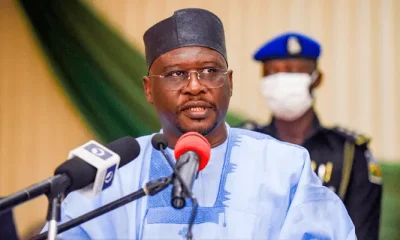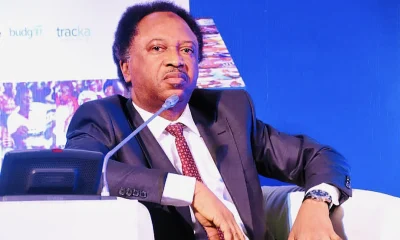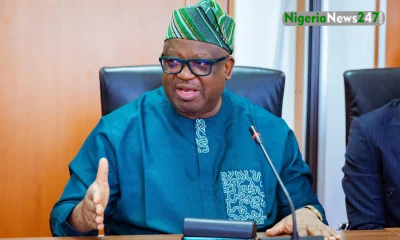POLITICS
2027: PDP sinks deeper as Atiku, ex-govs, others dump party

Nigerians are reacting strongly to what appears to be the impending collapse of the Peoples Democratic Party (PDP), following the exit of key figures, including former Vice President Atiku Abubakar, several ex-governors, and former Senate President David Mark.
In a major political development, Atiku and other influential PDP leaders held a meeting in Abuja on Tuesday under the banner of “Concerned Party Leaders.” During the meeting, they encouraged all patriotic Nigerians and committed party members to join a new coalition that promises to reshape the country’s political landscape.
This move confirms long-standing speculations about the exodus of top PDP leaders. Among those leaving with Atiku are former Governors Aminu Tambuwal (Sokoto), Babangida Aliyu (Niger), Liyel Imoke (Cross River), and Sam Egwu (Ebonyi). They are reportedly breaking away due to growing dissatisfaction with the party’s internal crises and leadership struggles.
Rift Widens Despite PDP’s Reassurances
The split comes just a day after the PDP’s National Executive Council (NEC) meeting, where acting National Chairman Umar Damagum claimed that internal issues had been resolved. One of the meeting’s major outcomes was the reaffirmation of Samuel Anyanwu as the party’s National Secretary—a move that many believe deepened existing rifts.
Some PDP leaders, including Bukola Saraki, Adolphus Wabara, and Bode George, attended the NEC meeting and expressed confidence in the party’s renewed direction. However, the separate gathering led by Atiku painted a starkly different picture.
The cracks in the party widened significantly after Atiku’s defeat of former Rivers State Governor Nyesom Wike in the 2023 presidential primaries. Wike responded by forming the G-5 group of governors who, while still in PDP, openly backed APC’s Bola Tinubu for president—a betrayal many saw as a major factor in the PDP’s electoral loss.
Analysts Say PDP Has Lost Its Identity
Political analyst Dr. Sani Abubakar blamed the PDP’s decline on its failure to provide credible opposition, accusing leaders like FCT Minister Nyesom Wike of undermining party unity.
“The PDP is already dead,” Abubakar said. “The party has become a platform for political double-dealers—PDP by day, APC by night. Wike has hijacked the party and made it ungovernable.”
He criticized the party’s handling of its internal disputes and warned that unless a new political ideology emerges, simply forming another opposition party would not be enough to challenge the ruling APC.
Atiku’s Position: Collapse, Not Defection
Amid the confusion, Eze Chukwuemeka Eze, a former spokesperson of the now-defunct nPDP and a known ally of Atiku, clarified that the former Vice President has not formally resigned from the PDP. Instead, he said, Atiku and his allies are working to “collapse” the PDP structure into a broader coalition—possibly under the African Democratic Congress (ADC).
“Atiku is the brain of the PDP. He’s not leaving it; he’s restructuring it,” Eze said. He blamed Wike and his loyalists for destroying the party from within and expressed hope that the coalition would offer a credible alternative to what he described as “Tinubu’s maladministration.”
Atiku’s Presidential Bids: A Legacy of Persistence
Atiku Abubakar has remained a dominant figure in Nigerian politics since the early 1990s. He has contested six presidential primaries and was a candidate in the 2007, 2019, and 2023 general elections, all of which ended in defeat. He also played key roles in the Social Democratic Party (SDP), Action Congress (AC), and All Progressives Congress (APC) at various points before returning to the PDP in 2017.
Despite his setbacks, Atiku continues to wield significant influence within Nigeria’s political space. The move toward a new coalition is seen by some as his final effort to reshape the opposition ahead of the 2027 elections.



















You must be logged in to post a comment Login